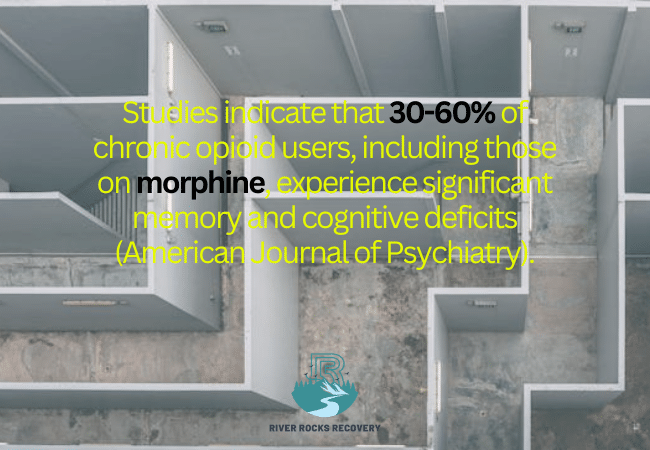Morphine, a powerful opioid commonly prescribed for pain management, plays a significant role in the treatment of acute and chronic pain. While it is effective as a pain reliever, prolonged use or misuse of morphine can have severe consequences, particularly on memory and cognitive function. These effects can hinder daily life, strain relationships, and complicate the recovery process for individuals battling addiction.
In this detailed exploration, we discuss how morphine impacts memory, the risks of long-term use, and the comprehensive treatment options available through professional care programs, including Addiction Treatment Program, Partial Hospitalization Program (PHP), Intensive Outpatient Program (IOP), and Sober Living Programs.
How Morphine Affects the Brain and Memory
Morphine’s primary action is to bind to opioid receptors in the brain, spinal cord, and other parts of the body. While this process blocks pain signals and produces euphoria, it also disrupts critical brain functions, including memory formation, emotional regulation, and cognitive processing.
1. Neurochemical Disruption
- Morphine alters the balance of neurotransmitters like dopamine, serotonin, and glutamate, which are crucial for learning and memory.
- The chemical imbalance leads to impaired signal transmission in the brain, reducing the ability to form and retain new memories.
2. Hippocampal Dysfunction
- The hippocampus, the brain’s memory hub, is highly sensitive to morphine. Prolonged exposure can shrink the hippocampus, leading to difficulties in spatial and declarative memory (e.g., recalling facts and events).
3. Prefrontal Cortex Impairment
- Morphine affects the prefrontal cortex, responsible for decision-making, problem-solving, and working memory. This results in a diminished ability to focus, plan, and solve problems effectively.
4. Long-Term Cognitive Decline
- Chronic use of morphine can cause neurotoxicity, damaging neurons and leading to lasting cognitive deficits. This includes memory loss, reduced processing speed, and difficulty recalling recent events or learning new information.
Short-Term Effects of Morphine on Memory
Morphine’s immediate effects on the brain, particularly its impact on memory, can be profound even during short-term use. These effects often stem from morphine’s ability to suppress neural activity, dull cognitive processes, and alter brain chemistry.
1. Impaired Short-Term Memory
- Difficulty Retaining Information: Morphine disrupts the hippocampus, the brain’s memory hub, making it harder to store and recall recent events.
- Reduced Cognitive Clarity: Morphine’s sedative effects create a “mental fog,” making it difficult to follow conversations or retain instructions.
- Fragmented Memory Formation: Users may struggle to form coherent memories, leading to partial recollection of events.
2. Blackouts or Memory Gaps
- Periods of Forgetfulness: High doses of morphine can temporarily block the brain’s ability to encode new information, leading to blackouts.
- Altered Perception of Time: Morphine slows cognitive processing, causing users to lose track of time or misremember sequences of events.
3. Decreased Attention Span
- Inability to Focus: The euphoric and sedative properties of morphine hinder concentration, further affecting the brain’s ability to retain short-term information.
- Distracted Thinking: Users may become easily distracted or unable to prioritize important information, impairing immediate memory function.
Long-Term Effects of Morphine Use on Memory and Cognition
Chronic morphine use can cause significant and lasting damage to the brain, with memory and cognitive function being among the most affected areas. Over time, these deficits can interfere with daily life, relationships, and the recovery process.
1. Memory Loss
- Retrograde Amnesia: Long-term morphine use can impair the ability to recall past memories, especially those tied to emotional or complex experiences.
- Anterograde Amnesia: Chronic use makes it difficult to form new memories, leading to forgetfulness and frequent lapses in recollection.
- Emotional Memory Impairment: Morphine disrupts the storage of emotionally charged memories, which can hinder learning from past experiences.
2. Cognitive Decline
- Slower Processing Speed: Long-term use reduces the brain’s ability to process information efficiently, leading to delayed responses and impaired decision-making.
- Difficulty with Complex Tasks: Activities requiring planning, analysis, or multitasking become increasingly challenging.
- Impaired Problem-Solving Skills: Morphine affects the prefrontal cortex, diminishing logical thinking and problem-solving abilities.
3. Neurotoxic Effects
- Damage to Brain Cells: Prolonged morphine exposure can lead to neurotoxicity, resulting in the loss of neurons and brain volume in areas critical to memory and cognition.
- Reduced Neuroplasticity: Morphine hampers the brain’s ability to adapt, repair, and form new neural connections, making recovery from memory loss more difficult.
4. Emotional and Psychological Impact on Memory
- Emotional Dysregulation: Morphine alters dopamine and serotonin levels, which are essential for mood and memory. Emotional instability exacerbates memory issues.
- Trauma Encoding Challenges: Chronic use may prevent individuals from processing or remembering traumatic experiences, complicating emotional healing during recovery.
Recognizing Signs of Morphine Addiction
Recognizing the signs of morphine misuse is the first step toward recovery.
Physical Symptoms:
- Drowsiness or nodding off frequently.
- Constricted pupils and slow breathing.
- Chronic constipation or nausea.
Behavioral Symptoms:
- Neglecting responsibilities or withdrawing from social interactions.
- Increased tolerance, requiring higher doses to achieve the same effect.
- Lying about or hiding morphine use.
Emotional Symptoms:
- Mood swings, irritability, or depression.
- Anxiety and paranoia, particularly during withdrawal periods.

The Connection Between Morphine Use and Addiction
Morphine is highly addictive due to its ability to produce intense euphoria and pain relief. Over time, the brain adapts to its presence, leading to dependency, withdrawal symptoms, and compulsive use. This cycle of addiction further impacts memory and cognition.
1. How Morphine Addiction Develops
- Activation of the Reward System: Morphine floods the brain with dopamine, creating a sense of euphoria. This reward reinforces repeated use.
- Tolerance Development: With continued use, the brain becomes less sensitive to morphine, requiring higher doses to achieve the same effect.
- Dependence: The brain begins to rely on morphine to regulate emotions and manage pain, leading to physical and psychological dependence.
2. Behavioral and Cognitive Effects of Addiction
- Compulsive Drug-Seeking Behavior: Addiction overrides rational thought, leading individuals to prioritize morphine use over responsibilities, relationships, and health.
- Memory-Related Challenges: Addiction-related behaviors, such as lying or hiding drug use, create additional stress and cognitive strain, worsening memory issues.
- Neglect of Cognitive Health: The focus on obtaining and using morphine often leads to neglect of mental stimulation, further degrading cognitive function.
3. Withdrawal and Its Impact on Memory
- Cognitive Disruption During Withdrawal: When morphine use stops, withdrawal symptoms like anxiety, irritability, and insomnia can impair focus and memory retention.
- Emotional Distress: The psychological toll of withdrawal may exacerbate existing memory problems, particularly if anxiety or depression is present.
4. The Role of Professional Treatment in Breaking the Cycle
- Medical Detox: Safely manages withdrawal symptoms, preventing further cognitive decline.
- Behavioral Therapy: Addresses the psychological aspects of addiction and helps rebuild healthy thought patterns.
- Support for Cognitive Recovery: Programs like Cognitive Behavioral Therapy (CBT) and mindfulness practices are designed to improve memory and cognitive function during recovery.
Seeking Help for Morphine Addiction
Effective recovery from morphine addiction requires professional intervention. Comprehensive treatment programs address both the physical dependency and the cognitive and emotional impacts of prolonged use.
Professional Treatment Options for Morphine Addiction:
- Addiction Treatment Program:
- A holistic approach to address physical, emotional, and psychological aspects of addiction.
- Partial Hospitalization Program (PHP):
- Intensive therapy and medical support during the day, with the flexibility to return home at night.
- Intensive Outpatient Program (IOP):
- A structured treatment program that allows individuals to maintain work or family responsibilities while receiving care.
- Outpatient Treatment Program:
- Ideal for those with mild addiction or transitioning from more intensive care.
- Sober Living Program:
- Provides a safe and supportive environment for individuals reintegrating into daily life while maintaining sobriety.
The Role of Memory in Recovery
Recovery from morphine addiction often involves addressing memory impairments. The brain’s neuroplasticity allows it to adapt and recover over time with the right interventions.
Strategies to Improve Memory During Recovery:
- Cognitive Behavioral Therapy (CBT): Focuses on building new cognitive patterns and improving memory-related behaviors.
- Nutrition and Hydration: A balanced diet supports brain health and enhances neurogenesis (the formation of new brain cells).
- Regular Exercise: Physical activity increases blood flow to the brain, aiding in memory recovery.
- Mindfulness and Relaxation: Meditation and yoga can help reduce stress and improve focus, benefiting memory and emotional regulation.
Why Professional Care is Essential
Professional addiction treatment provides the structure, medical supervision, and emotional support needed for successful recovery. Facilities like an Addiction Treatment Center in Ohio offer evidence-based programs to address the multifaceted challenges of morphine addiction.
Key Benefits of Professional Treatment:
- Detox Services: Medical support to safely manage withdrawal symptoms.
- Integrated Mental Health Care: Addressing co-occurring conditions such as anxiety or depression.
- Holistic Therapies: Incorporating activities like art therapy, mindfulness, and yoga to support emotional and cognitive recovery.
- Community Support: Group therapy and peer connections foster accountability and encouragement.
Conclusion
Morphine’s impact on memory and cognitive function can be significant, but recovery is possible with the right support. Comprehensive treatment programs like Addiction Treatment, Partial Hospitalization Programs, and Sober Living Programs provide the tools needed to rebuild both physical health and cognitive abilities.
If you or a loved one is struggling with morphine addiction, don’t wait to seek help. An Addiction Treatment Center in Ohio can provide the specialized care and support needed for a successful recovery. Your path to recovery starts with the right support—don’t hesitate to reach out us at:(888) 905-6281 today.
FAQ on How Does Morphine Affect Memory?
How does morphine impact memory in the short term?
Morphine can impair short-term memory by disrupting brain activity, leading to difficulty retaining information, blackouts, and reduced focus.
Can long-term morphine use cause permanent memory loss?
Chronic morphine use can lead to significant memory impairment, including difficulties recalling past events and forming new memories. Prolonged use may also cause long-term cognitive decline due to neurotoxicity.
How does morphine addiction affect memory?
Morphine addiction exacerbates memory issues by altering brain chemistry and increasing stress on cognitive functions. Withdrawal symptoms and emotional instability can further impair memory and focus.
Can memory improve after stopping morphine?
With proper treatment, including therapy and lifestyle changes, memory can improve over time. The brain’s neuroplasticity allows it to recover partially, but severe cases may require long-term care.
What treatments are available for morphine addiction and memory recovery?
Programs like Addiction Treatment Programs, Partial Hospitalization Programs (PHPs), and Intensive Outpatient Programs (IOPs) offer comprehensive care to address both addiction and cognitive challenges.




























